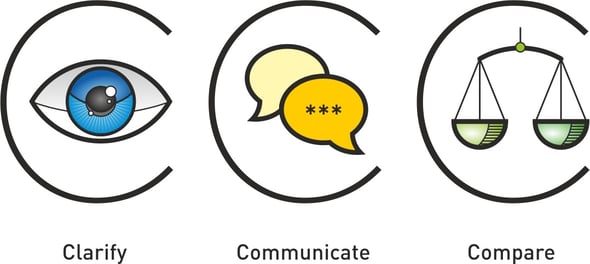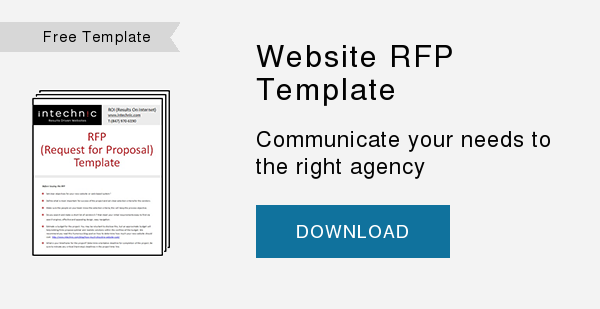How to Write an Effective Website RFP (Request for Proposal)
 A Request for Proposal (RFP) is a document that is written by your company and provided to prospective web developers. An RFP is an invitation to bid on your project, and it outlines your website requirements, existing challenges, and business objectives. There are three reasons why a written RFP is strongly recommended. I call them the three C’s of RFPs: clarify, communicate and compare. 1) Clarify. The RFP is a process that facilitates design and definition of your business objectives and requirements. By writing an RFP, you will compile thoughts, outline your needs and ensure that all aspects of the project are detailed thoroughly. 2) Communicate. The RFP clearly communicates business goals, objectives and requirements to prospects. It also provides a paper trail and avoids misunderstandings. 3) Compare. Finally, the RFP creates a thorough point of reference for comparing and contrasting all proposals. By providing all candidates with the same RFP, proposal comparisons are easily done.
A Request for Proposal (RFP) is a document that is written by your company and provided to prospective web developers. An RFP is an invitation to bid on your project, and it outlines your website requirements, existing challenges, and business objectives. There are three reasons why a written RFP is strongly recommended. I call them the three C’s of RFPs: clarify, communicate and compare. 1) Clarify. The RFP is a process that facilitates design and definition of your business objectives and requirements. By writing an RFP, you will compile thoughts, outline your needs and ensure that all aspects of the project are detailed thoroughly. 2) Communicate. The RFP clearly communicates business goals, objectives and requirements to prospects. It also provides a paper trail and avoids misunderstandings. 3) Compare. Finally, the RFP creates a thorough point of reference for comparing and contrasting all proposals. By providing all candidates with the same RFP, proposal comparisons are easily done.

An effective RFP should be worded clearly and directly. Its purpose is to provide specific business goals. Compose the RFP with clarity, and ensure that the content details the objectives, deadlines and budget. Many experienced web development companies offer specialized worksheets and questionnaires that are designed to aid in this process. I advise that you request these documents in order to shed more light on their plan for your project. The framework in their form’s content will reveal the web developer’s experience and capabilities. If a web developer doesn’t have a procedure at the outset of the project, or if they do not pose a series of questions, it should raise some red flags about the distinction and quality of this organization. The following outline will help you put together an effective RFP. Start with your general company information, and then focus on the project and business needs. Skip any items that are not applicable to your project.
Business Overview
- Describe your business. Describe the products and/or services that you offer and whether you market to other businesses, consumers or both.
- Describe your industry.
- Who are some of your major competitors? List their website URLs.
- What sets you apart from the competition? What is the competitive edge that makes your products or services unique, i.e., price point, features, value?
- Do you already have a website? If yes, what is the URL, and what are the known problems or issues with it? What do you like and dislike about it? Can you provide visitor analytics?
Website Business Objectives
- Why is the project necessary?
- List S.M.A.R.T. business objectives for the website. Test each objective against the S.M.A.R.T. model and provide details (see the previous section).
- What is your budget for the project? You may be reluctant to disclose this, but an approximate budget will help web developers propose optimal and realistic solutions within the confines of the budget. You may also learn your budget is not adequate for your expectations. It is better to include at least an “up to” number or a ballpark range. If you are seeking a true professional, fully disclose this information with your expectations. They also want to know that you are serious about the project and that you will see it through to completion. If you begin the relationship with a forthright delivery, it will help to cement the long-term, positive relationship with your developer.
- What is your timeframe for the project? Include the deadline for the proposal submission, expected turnaround time for decision, and anticipated start and completion dates. Be sure to indicate any critical (hard-stop) deadlines in the project time line.
Target Audience and Experience
- Who is your target audience? Describe your ideal customer. What are your ideal customer’s demographics?
- What actions do you want users to take when visiting your site? Examples: make a purchase, request information, call, register, sign-up for a newsletter.
- How do you want your audience to perceive your brand? Describe the image you want the user to identify with your brand (reputable, dependable, innovative, prestigious, fun, cutting edge).
- Why should your potential customers choose to do business with you? Why should your customers care about what you have to offer? What are the benefits to them? How do your products or services help improve their lives?
- Is there a common problem or an industry pain that your products or services help solve? What is your solution?
- What is the single most important message your website visitors should take away? It is your most important BIG IDEA.
- How can this message be made believable? What support can you provide to lend credence to this message? Are there any visuals, charts, analogies, metaphors, testimonials or any other data, props or tools that can be used to project credibility and enhance your message?
- Color scheme: Do you have corporate or preferred colors? Do you have a branding guide? If yes, include it with the RFP.
- Are there any existing assets that should be used in the new website (logo, branding guidelines, screen mockups, copywriting, photography, videos)?
- What are some websites that inspire you? Describe what you like about them. Give examples (provide URLs), and be specific.
- When you close your eyes and visualize your site, what do you see?
- What do you dislike on websites and want to avoid? Give examples (provide URL), and be specific.
- Are there any specific functions or features that you would like to see on your website? Examples: product catalog, shopping cart, mailing list, user registration, blog, information request form.
- Are you going to be managing the content for the website? If yes, how will the content be provided? What type of data do you have? How much content do you have?
- Are you going to be managing the updates to the website in-house? If yes, how often would you make updates? Do you have any requirements for the Content Management System (CMS)?
- What type and depth of ongoing support and maintenance will you need or expect the web developer to provide?
- Are there any technical requirements or limitations (hosting considerations, database, programming language)? You may want to confer with your IT Department.
- Are there any legal or compliance requirements such as HIPAA, PCI or accessibility (508)?
- Do you need a responsive (mobile-friendly) support or your website?
- Will you be managing the hosting of the website, or will you require the web developer to provide or assist with hosting services?
- Will you be managing the marketing and Search Engine Optimization (SEO) of the website, or do you require the web developer to provide or assist with marketing and SEO?
- Are there any other issues that should be taken into consideration? List any concerns, challenges or limitations that you would like to be addressed.
- List any requirements or expectations you may have for the companies that will be bidding on your project (areas of expertise, capabilities, background and history, staff, support process, references, years of experience).
- List any special requirements you may have for the proposal, including how and when it needs to be submitted. Include a deadline for the proposal submissions.
- Include explanation of how the decision making process will be made. This will allow web developers to tailor the proposals to address your concerns and requirements.
- Who is going to be the main point of contact in your organization? If there are two or more contacts with specific roles, list all names. Also list third parties or subcontractors, if applicable.
- In the event that prospective web developers have additional questions, include detailed contact information as well as instructions on how to submit questions.









